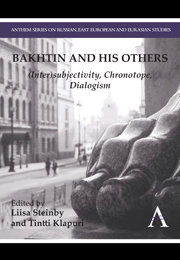Book contents
- Frontmatter
- Contents
- Acknowledgments
- Translation and Transliteration
- Introduction: The Acting Subject of Bakhtin
- Chapter 1 Bakhtin and Lukács: Subjectivity, Signifying Form and Temporality in the Novel
- Chapter 2 Bakhtin, Watt and the Early Eighteenth-Century Novel
- Chapter 3 Concepts of Novelistic Polyphony: Person-Related and Compositional-Thematic
- Chapter 4 Familiar Otherness: Peculiarities of Dialogue in Ezra Pound's Poetics of Inclusion
- Chapter 5 Author and Other in Dialogue: Bakhtinian Polyphony in the Poetry of Peter Reading
- Chapter 6 Tradition and Genre: Thomas Kyd's The Spanish Tragedy
- Chapter 7 Bakhtin's Concept of the Chronotope: The Viewpoint of an Acting Subject
- Chapter 8 The Provincial Chronotope and Modernity in Chekhov's Short Fiction
- List of Contributors
Chapter 2 - Bakhtin, Watt and the Early Eighteenth-Century Novel
Published online by Cambridge University Press: 05 May 2013
- Frontmatter
- Contents
- Acknowledgments
- Translation and Transliteration
- Introduction: The Acting Subject of Bakhtin
- Chapter 1 Bakhtin and Lukács: Subjectivity, Signifying Form and Temporality in the Novel
- Chapter 2 Bakhtin, Watt and the Early Eighteenth-Century Novel
- Chapter 3 Concepts of Novelistic Polyphony: Person-Related and Compositional-Thematic
- Chapter 4 Familiar Otherness: Peculiarities of Dialogue in Ezra Pound's Poetics of Inclusion
- Chapter 5 Author and Other in Dialogue: Bakhtinian Polyphony in the Poetry of Peter Reading
- Chapter 6 Tradition and Genre: Thomas Kyd's The Spanish Tragedy
- Chapter 7 Bakhtin's Concept of the Chronotope: The Viewpoint of an Acting Subject
- Chapter 8 The Provincial Chronotope and Modernity in Chekhov's Short Fiction
- List of Contributors
Summary
In a number of his studies Mikhail Bakhtin pays attention to the history of the novel, identifying various traditions of the genre and naming them so as to create a typology for the novel and define the characteristics of these types. What is palpable in Bakhtin's view of the history of the novel is his firm emphasis on certain authors and phases of the genre. On the one hand he emphasizes Renaissance folklore and the carnival tradition as represented in particular by Rabelais; on the other, his interest lies in the Bildungsroman, the late eighteenth-century novel of education. Bakhtin highlights in particular two of Goethe's novels, Wilhelm Meister's Apprenticeship (1795–96) and Wilhelm Meister's Journeyman Years (1821–29), which represent for Bakhtin a seminal turning point in the history of the novel. In addition, we recognize Bakhtin as a theorist – and devotee of – Dostoevsky's novels, in which he perceived the polyphonic novel in its most possible perfection. Bakhtin seemed to focus specifically on these writers in order to emphasize their position as the crowning literary representatives of their respective historical ages (cf. Brandist 2002, 133). All in all, the novel was for Bakhtin not merely one literary genre among others: it stood for a profound form of thinking that represented the prevalent views and ideas of the historical period in question (Burton 1996, 44).
- Type
- Chapter
- Information
- Bakhtin and his Others(Inter)subjectivity, Chronotope, Dialogism, pp. 19 - 36Publisher: Anthem PressPrint publication year: 2013



